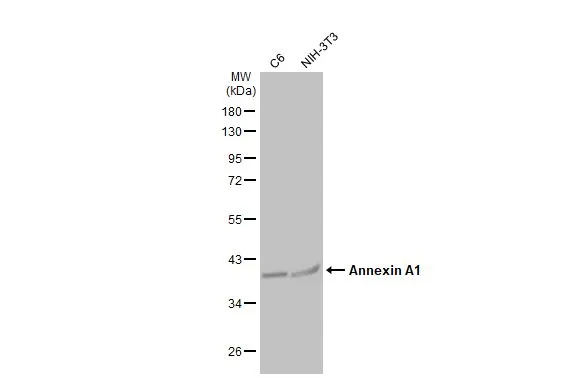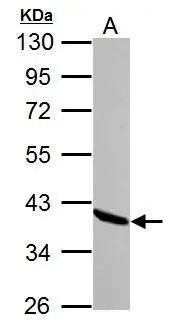![IHC-P analysis of human tonsil tissue section using GTX02590 Annexin A1 antibody [ANXA1/3869R]. IHC-P analysis of human tonsil tissue section using GTX02590 Annexin A1 antibody [ANXA1/3869R].](https://www.genetex.com/upload/website/prouct_img/normal/GTX02590/GTX02590_20210319_IHC-P_w_23053122_772.webp)
IHC-P analysis of human tonsil tissue section using GTX02590 Annexin A1 antibody [ANXA1/3869R].
Annexin A1 antibody [ANXA1/3869R]
GTX02590
ApplicationsImmunoPrecipitation, Western Blot, ImmunoHistoChemistry, ImmunoHistoChemistry Paraffin
Product group Antibodies
ReactivityHuman, Mouse
TargetANXA1
Overview
- SupplierGeneTex
- Product NameAnnexin A1 antibody [ANXA1/3869R]
- Delivery Days Customer9
- Application Supplier NoteWB: 1-2 microg/ml. IHC-P: 1-2 microg/ml. IP: 2-4 microg/mg protein. *Optimal dilutions/concentrations should be determined by the researcher.Not tested in other applications.
- ApplicationsImmunoPrecipitation, Western Blot, ImmunoHistoChemistry, ImmunoHistoChemistry Paraffin
- CertificationResearch Use Only
- ClonalityMonoclonal
- Clone IDANXA1/3869R
- Concentration200 ug/ml
- ConjugateUnconjugated
- Gene ID301
- Target nameANXA1
- Target descriptionannexin A1
- Target synonymsANX1, LPC1, annexin A1, annexin I (lipocortin I), annexin-1, calpactin II, calpactin-2, chromobindin-9, epididymis secretory sperm binding protein, phospholipase A2 inhibitory protein
- HostRabbit
- IsotypeIgG
- Protein IDP04083
- Protein NameAnnexin A1
- Scientific DescriptionThis gene encodes a membrane-localized protein that binds phospholipids. This protein inhibits phospholipase A2 and has anti-inflammatory activity. Loss of function or expression of this gene has been detected in multiple tumors. [provided by RefSeq, Dec 2014]
- ReactivityHuman, Mouse
- Storage Instruction2°C to 8°C
- UNSPSC12352203
References
- Huang T, Li S, Fang J, et al. Antibody-activated trans-endothelial delivery of mesoporous organosilica nanomedicine augments tumor extravasation and anti-cancer immunotherapy. Bioact Mater. 2021,6(7):2158-2172. doi: 10.1016/j.bioactmat.2020.12.023Read this paper

![WB analysis of A549 whole cell lysate using GTX02590 Annexin A1 antibody [ANXA1/3869R]. WB analysis of A549 whole cell lysate using GTX02590 Annexin A1 antibody [ANXA1/3869R].](https://www.genetex.com/upload/website/prouct_img/normal/GTX02590/GTX02590_20210319_WB_w_23053122_812.webp)
![IHC-P analysis of human tonsil tissue section using GTX02590 Annexin A1 antibody [ANXA1/3869R]. IHC-P analysis of human tonsil tissue section using GTX02590 Annexin A1 antibody [ANXA1/3869R].](https://www.genetex.com/upload/website/prouct_img/normal/GTX02590/GTX02590_20210319_IHC-P_1_w_23053122_823.webp)




![Various whole cell extracts (30 μg) were separated by 10% SDS-PAGE, and the membrane was blotted with Annexin A1 antibody [HL2141] (GTX638119) diluted at 1:1000. The HRP-conjugated anti-rabbit IgG antibody (GTX213110-01) was used to detect the primary antibody.](https://www.genetex.com/upload/website/prouct_img/normal/GTX638119/GTX638119_T-44928_20230210_WB_R_M_23021401_656.webp)
![Wild-type (WT) and ANXA1 knockout (KO) HeLa cell extracts (30 μg) were separated by 10% SDS-PAGE, and the membrane was blotted with Annexin A1 antibody [HL2142] (GTX638120) diluted at 1:1000. The HRP-conjugated anti-rabbit IgG antibody (GTX213110-01) was used to detect the primary antibody.](https://www.genetex.com/upload/website/prouct_img/normal/GTX638120/GTX638120_T-44928_20230310_WB_KO_watermark_23031402_789.webp)
![WB analysis of wild type and Annexin A1 knock out HeLa cell lysate(10μg per lane) using GTX84886 Annexin A1 antibody [3A8]. Dilution : 1:500](https://www.genetex.com/upload/website/prouct_img/normal/GTX84886/GTX84886_4694_20181228_WB_w_23061420_137.webp)